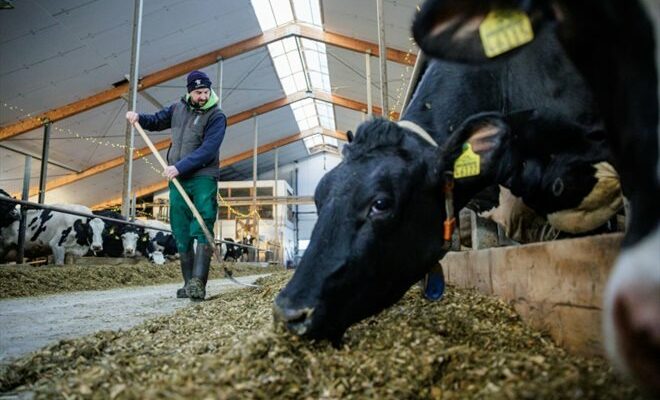Breeder Marc Bernhardt on his dairy cow farm, January 10, 2024 in Freital, eastern Germany (AFP/JENS SCHLUETER)
For more than a century, Marc Bernhardt’s family has managed a dairy cow farm in the Saxon countryside in eastern Germany. But passing the torch to a new generation will be difficult, warns the breeder.
Its production costs have increased by “40%” since the war in Ukraine, and the price of its electricity has jumped by “50%”, he told AFP. “If we continue like this, we will have to do something else,” laments the 37-year-old farmer, based in Freital, south of Dresden.
While the average income of German farmers increased by 45% last year, family farms, which represent half of the sector’s businesses in Germany, still suffer from high production costs that they struggle to cover.
Difficulties which can explain the extent of the mobilization of farmers since the start of the year against the removal of tax advantages for agricultural diesel.
Thousands of them gathered with their tractors on Monday in Berlin, in front of the emblematic Brandenburg Gate, to end a week of mobilization against this project.
– “Same job, less money” –
On his farm of around a hundred dairy cows, where he also grows cereals and corn, Marc Bernhardt works alone with his father. The latter took over the farm in the early 1990s, returning to the family after years of collectivization under the communist regime of East Germany.

Breeder Marc Bernhardt on his dairy cow farm, January 10, 2024 in Freital, eastern Germany (AFP/JENS SCHLUETER)
Today, dairy production is fully automated, with the cows moving themselves to the milking machine, which operates without human intervention. A robot vacuum cleaner regularly cleans the stable.
For Marc Bernhardt, the removal of exemptions on diesel will lead to a “10 to 15%” drop in his subsidies. In Germany, more than half of agricultural income depends on public aid.
“It’s unfair to provide the same amount of work for less money,” protests the sturdy bearded man.
A member of an independent farmers’ collective, he also went to Berlin to demonstrate on Monday.
The elimination of tax loopholes was decided to plug the holes in the country’s 2024 budget, after a call to order from the Constitutional Court.
The government estimated that with the increase in farmers’ incomes in recent years, the sector could absorb these cost increases.
“It’s a fair contribution,” Liberal Finance Minister Christian Lindner defended Monday to farmers in Berlin. “My goal is not to weaken agriculture,” he said, to the whistles of the demonstrators.

Dairy cows on the farm of breeder Marc Bernhardt, January 10, 2024 in Freital, eastern Germany (AFP/JENS SCHLUETER)
According to industry figures, German farmers earned an average annual profit of 115,400 euros in 2023 from their main activity: a record and around 45% more than in 2022.
These good results can be explained by “short-term price increases” on the markets over the last two years, against a backdrop of inflation in all developed countries, Martin Odening, professor of agroeconomics at Humboldt University in Berlin.
– Diversify your income –
But “we must not forget the losses of previous years, especially as prices remain volatile”, fixed on global markets, underlines Mr. Odening. Some have already decreased recently, notably milk.

Breeder Marc Bernhardt on his dairy cow farm, January 10, 2024 in Freital, eastern Germany (AFP/JENS SCHLUETER)
Above all, the income level “is only an average”, notes the expert. “Some farms have not managed to offset the increase in costs with this increase in turnover,” he points out.
Added to this, for small structures, are costly investments to comply with environmental standards as well as the difficulties of finding labor and a buyer when the operator retires, according to a study by DZ Bank.
These factors make the economic survival of family farms and small and medium-sized structures difficult, while international competition imposes ever greater levels of profitability.
“We really wonder if it is still worth it to have a small farm like ours,” says Nathalie Diebow, 26, currently in training, who demonstrated last Thursday in Cottbus (east).
The number of farms in Germany, down 12% between 2010 and 2020, is expected to increase from 256,000 currently to 100,000 by 2040, according to DZ Bank. With this concentration phenomenon, their average size should increase from 64.8 to 160 hectares.
To diversify his income, Marc Bernhardt decided to open an inn, an educational farm and install solar panels. But nothing will replace milk production for him: “I have it in my blood.”
© 2024 AFP
Did you like this article ? Share it with your friends using the buttons below.




